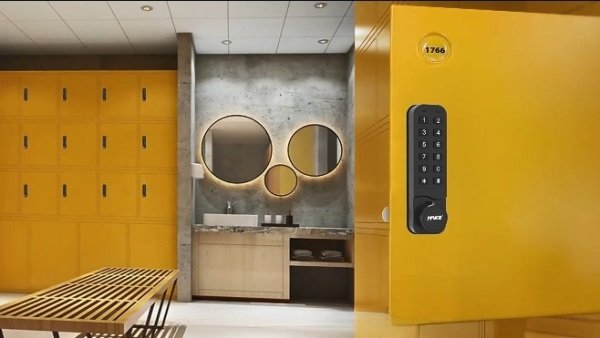With the arrival of high temperatures during summer vacation, especially on weekends and holidays, many users flock to swimming pools.
Swimming pool lockers are placed in public spaces for temporary use by multiple people. How can locks adapt to peak pool traffic pressure, alleviate locker shortages, and ensure more orderly operation?

We recommend the MK731, which helps swimming pools easily handle various emergencies and increase locker utilization.
Scenario 1: A user is leaving after a swim but forgets their password and can’t unlock the lock, preventing them from changing clothes or retrieving their belongings.
In addition to unlocking with the user password, the MK731 can also be unlocked using the administrator password, mot de passe du gestionnaire, et clé mécanique.

Lorsqu'un utilisateur demande de l'aide, le personnel peut utiliser l'une de ces trois méthodes pour traiter rapidement l'urgence, résoudre la frustration de l'utilisateur, et alléger la pression sur les casiers au sein de l'établissement.
Scenario 2: Un utilisateur signale qu'il n'y a pas de casiers disponibles et que tous sont verrouillés.
Lorsque l'utilisateur retire ses affaires, il peut fermer le casier, donnant l'apparence que le casier est occupé.
Lors de la recherche de casiers vides, les nouveaux utilisateurs ont tendance à se concentrer sur les casiers dont la porte est ouverte, supposant inconsciemment que les casiers verrouillés ne sont pas utilisables.
Après avoir déverrouillé le cadenas, le MK731 efface le mot de passe temporaire de l’utilisateur et reste ouvert jusqu'à ce que le prochain utilisateur saisisse son mot de passe à quatre chiffres.
Même si la porte du casier est fermée, si aucun mot de passe n'est défini, le casier peut être ouvert simplement en tournant le bouton.
Staff no longer need to turn the knob to check each locker individually for vacant lockers.
The MK731 features an occupancy indicator. When the locker is occupied, the green LED flashes once every six seconds, indicating that the locker is in use.

The optical indicator light allows for quick identification, helping new users quickly find an empty locker.
En résumé, le swimming pool locker lock MK731 improves the utilization rate of lockers. Locker companies are welcome to learn more details.
 Chine meilleure serrure de mobilier de bureau, fabricants de serrures de casiers ODM/OEM – Faire verrouiller Copmany
Chine meilleure serrure de mobilier de bureau, fabricants de serrures de casiers ODM/OEM – Faire verrouiller Copmany
